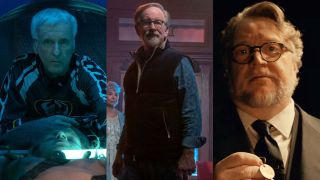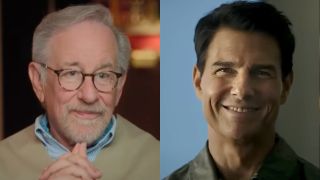Steven Spielberg
Latest about Steven Spielberg

Before Disclosure Day, Let's Talk About The Other 4 Times Steven Spielberg Has Made Alien Movies
By Hugh Scott published
From cute and cuddly to scary and mean, Spielberg knows how to make alien movies.

Steven Spielberg Clearly Found A Way, Because Netflix's Dinosaurs Docuseries Looks Insane
By Kelly West published
Hold onto your butts, Netflix subscribers!

I Didn’t See Steven Spielberg Becoming An EGOT Coming, But Rachel Zegler And Jennifer Hudson Are Tickled Pink
By Ryan LaBee published
I missed the EGOT signs, but these artists saw it coming.

Steven Spielberg Is Now An EGOT Winner, Joining The List Of Celebrities To Earn An Emmy, Grammy, Oscar, And Tony Award
By Jerrica Tisdale last updated
There are currently 18 EGOT winners. Learn them all and what performances got them some of these awards.

The Moment New Hollywood It Girl Odessa A'zion Knew Marty Supreme Was A Big Deal
By Eric Eisenberg published
This is surprisingly relatable.

Guillermo Del Toro Talks Screening His Movies For Pals Like Steven Spielberg And James Cameron, And I Wish I Could Be A Fly On The Wall
By Dirk Libbey published
The greatest directors sit together and talk movies? Where do I sign up?

Colman Domingo Talks Steven Spielberg's Disclosure Day, And I'm Excited By How Much It Sounds Like The Director's Classics
By Mick Joest published
I'm so excited for this movie.

I Wish I Could Have Been A Fly On The Wall As Shawn Levy Reveals What Steven Spielberg And Tom Cruise Were Doing On The Starfighter Set
By Dirk Libbey published
Two Hollywood heavy hitters visited the set, and one got his hands (and feet) dirty.
Your Daily Blend of Entertainment News


